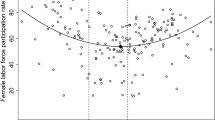Abstract
Rosalind Eyben describes her participation in a high-level international meeting on women's economic empowerment. She examines how the concept of empowerment is being constructed, contested and shaped in international aid policy.
Similar content being viewed by others
Notes
I had sought the prior agreement of the organizers to using this experience for the purposes of the present article, stressing I would respect anonymity.
Apparently, there had been some disagreement among the conference organizers concerning the programme structure, some arguing for break out groups.
Part of the reason for this was because economic empowerment, while the principal theme, was not the only one.
To preserve conference participants’ anonymity, no citation is provided for conference documentation from which these and other quotations have been taken.
References
Batliwala, Srilatha (2007) ‘Taking the Power Out of Empowerment – An experiential account’, Development in Practice 17 (4): 557–565.
Eyben, Rosalind, Naila Kabeer and Andrea Cornwall (2008) ‘Conceptualising Empowerment and the Implications for Pro Poor Growth’, A paper for the DAC Poverty Network, http://preval.org/files/povnet%20draft%2023%20september%202008.pdf, accessed 12 April 2010.
Eyben, Rosalind and Rebecca Napier-Moore (2009) ‘Choosing Words with Care? Shifting meanings of women's empowerment in international development’, Third World Quarterly 30 (2): 285–300.
Hayward, Clarissa Rile (2000) Defacing Power, Cambridge: Cambridge University Press.
Hossain, Naomi (2009) ‘Accounts of Crisis: Poor people's experience of the food, fuel and financial crises’, Institute of Development Studies, http://www.ids.ac.uk/index.cfm?objectid=7BEEE2E6-E888-1C81-4222828ABE71B95A, accessed 12 April 2010.
World Bank (2006) Gender Equality as Smart Economics: A World Bank group gender action plan (Fiscal years 2007–10), Washington, DC: World Bank.
Additional information
Describes the ins and outs of a high level international meeting on women's economic empowerment
Rights and permissions
About this article
Cite this article
Eyben, R. What if the Girls Don’t Want to be Businesswomen?: Discursive dissonance in a global policy space. Development 53, 274–279 (2010). https://doi.org/10.1057/dev.2010.13
Published:
Issue Date:
DOI: https://doi.org/10.1057/dev.2010.13



